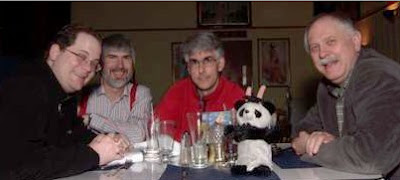John Mattick publishes lots of papers. Most of them are directed toward proving that almost all of the human genome is functional. I want to remind you of some of the things that John Mattick has said in the past so you'll be prepared to appreciate my next post [The Junk DNA Controversy: John Mattick Defends Design].
Mattick believes that the Central Dogma means DNA makes RNA makes protein. He believes that scientists in the past took this very literally and discounted the importance of RNA. According to Mattick, scientists in the past believed that genes were the only functional part of the genome and that all genes encoded proteins.
If that sounds familiar it's because there are many IDiots who make the same false claim. Like Mattick, they don't understand the Central Dogma of Molecular Biology and they don't understand the history that they are distorting.
 Mattick believes that there is a correlation between the amount of noncoding DNA in a genome and the complexity of the organism. He thinks that the noncoding DNA is responsible for making tons of regulatory RNAs and for regulating expression of the genes. This belief led him to publish a famous figure (left) in Scientific American.
Mattick believes that there is a correlation between the amount of noncoding DNA in a genome and the complexity of the organism. He thinks that the noncoding DNA is responsible for making tons of regulatory RNAs and for regulating expression of the genes. This belief led him to publish a famous figure (left) in Scientific American.Mattick has many followers. So many, in fact, that the Human Genome Organization (HUGO) recently gave him an award for his contributions to the study of the human genome. Here's the citation.
Theme
Genomes
& Junk DNA
The Award Reviewing Committee commented that Professor Mattick’s “work on long non-coding RNA has dramatically changed our concept of 95% of our genome”, and that he has been a “true visionary in his field; he has demonstrated an extraordinary degree of perseverance and ingenuity in gradually proving his hypothesis over the course of 18 years.”Let's see what this "true visionary" is saying this year. The first paper is "The dark matter rises: the expanding world of regulatory RNAs" (Clark et al., 2013). Here's the abstract ...
The ability to sequence genomes and characterize their products has begun to reveal the central role for regulatory RNAs in biology, especially in complex organisms. It is now evident that the human genome contains not only protein-coding genes, but also tens of thousands of non–protein coding genes that express small and long ncRNAs (non-coding RNAs). Rapid progress in characterizing these ncRNAs has identified a diverse range of subclasses, which vary widely in size, sequence and mechanism-of-action, but share a common functional theme of regulating gene expression. ncRNAs play a crucial role in many cellular pathways, including the differentiation and development of cells and organs and, when mis-regulated, in a number of diseases. Increasing evidence suggests that these RNAs are a major area of evolutionary innovation and play an important role in determining phenotypic diversity in animals.This is his main theme. Mattick believes that a large percentage of the human genome is devoted to making regulatory RNAs that control development. He believes that the evolution of this complex regulatory network is responsible for the creation of complex organisms like humans, which, incidentally, are the pinnicle of evolution according to the figure shown above.
The second paper I want to highlight focuses on a slightly different theme. It's title is "Understanding the regulatory and transcriptional complexity of the genome through structure." (Mercer and Mattick, 2013). In this paper he emphasizes the role of noncoding DNA in creating a complicated three-dimensional chromatin structure within the nucleus. This structure is important in regulating gene expression in complex organisms. Here's the abstract ...
An expansive functionality and complexity has been ascribed to the majority of the human genome that was unanticipated at the outset of the draft sequence and assembly a decade ago. We are now faced with the challenge of integrating and interpreting this complexity in order to achieve a coherent view of genome biology. We argue that the linear representation of the genome exacerbates this complexity and an understanding of its three-dimensional structure is central to interpreting the regulatory and transcriptional architecture of the genome. Chromatin conformation capture techniques and high-resolution microscopy have afforded an emergent global view of genome structure within the nucleus. Chromosomes fold into complex, territorialized three-dimensional domains in concert with specialized subnuclear bodies that harbor concentrations of transcription and splicing machinery. The signature of these folds is retained within the layered regulatory landscapes annotated by chromatin immunoprecipitation, and we propose that genome contacts are reflected in the organization and expression of interweaved networks of overlapping coding and noncoding transcripts. This pervasive impact of genome structure favors a preeminent role for the nucleoskeleton and RNA in regulating gene expression by organizing these folds and contacts. Accordingly, we propose that the local and global three-dimensional structure of the genome provides a consistent, integrated, and intuitive framework for interpreting and understanding the regulatory and transcriptional complexity of the human genome.Other posts about John Mattick.
How Not to Do Science
John Mattick on the Importance of Non-coding RNA
John Mattick Wins Chen Award for Distinguished Academic Achievement in Human Genetic and Genomic Research
International team cracks mammalian gene control code
Greg Laden Gets Suckered by John Mattick
How Much Junk in the Human Genome?
Genome Size, Complexity, and the C-Value Paradox
Clark, M.B., Choudhary, A., Smith, M.A., Taft, R.J. and Mattick, J.S. (2013) The dark matter rises: the expanding world of regulatory RNAs. Essays in Biochemistry 54:1-16. [doi:10.1042/bse0540001]
Mercer, T.R. and Mattick, J.S. (2013) Understanding the regulatory and transcriptional complexity of the genome through structure. Genome research 23:1081-1088 [doi: 10.1101/gr.156612.113]




































